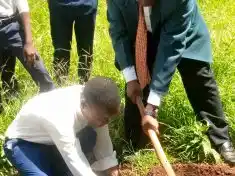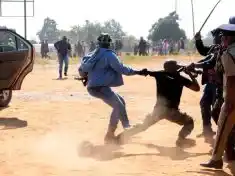
The Wildlife Society of Malawi has partnered with Malosa Anglican Secondary School in a tree-planting campaign aimed at restoring degraded land and promoting environmental conservation among students.
The exercise, which took place during the week at the school’s campus in Zomba, saw over 500 tree seedlings planted by students and teachers.
The trees included both indigenous species and exotic species chosen to enhance biodiversity and provide long-term benefits to the school environment.
Speaking at the event, Benjamin Voss, a representative from the Wildlife Society of Malawi, emphasized the need to involve young people in conservation efforts.
“Engaging students in activities like this fosters a sense of responsibility and equips them with knowledge to address environmental challenges,” he said.
Students from the school’s Environmental and Wildlife Clubs led the initiative, taking an active role in digging holes, planting, and watering the seedlings. Many expressed pride in contributing to a greener Malawi.
“This experience has taught me the importance of trees in combating climate change,” said Kestern Khuwani, a form four student.
“We feel proud to be part of something that will benefit future generations.”
The coordinator of the school’s Wildlife Club, Asani Ayami, commended the students for their enthusiasm and commitment to protecting the environment.
“We believe that conservation starts with education. Our learners are not just planting trees — they are growing into environmental stewards who will carry this mission forward,” he said.
The Guest of Honour at the event, Bill Ntambo, who represents the Bishop of the Diocese of Upper Shire, praised the collaboration and encouraged more schools to take part in similar activities.
“Planting a tree is an investment in the future. It is encouraging to see young people embracing environmental action.
Malosa Anglican Secondary School is setting a great example for others to follow,” he said.
The school’s head teacher, Peter Bamusi, welcomed the initiative, calling it a valuable learning opportunity.
By Tiwamyenji Hanken Boma






0 Comments